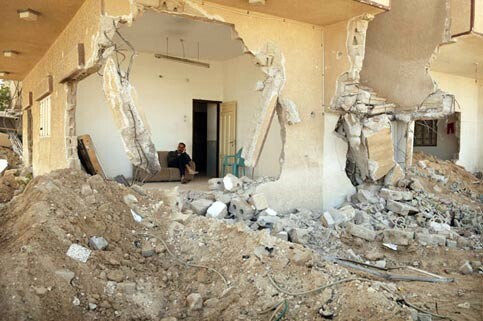United Nations News Service 8 September 2004

The aftermath of “Operation Rainbow” in Brazil refugee camp, Rafah, Gaza. (Johannes Abeling)
GAZA -– The United Nations Relief and Works Agency for Palestine Refugees in the Near East (UNRWA) today handed over 103 new homes to families from Rafah refugee camp whose shelters have been destroyed by the Israeli military during the intifada. The Agency has also opened a new school whose pupils will largely be those who have lost their homes during the conflict.
A ceremony planned to mark the handover has been postponed because the Gaza Strip has been cut into three by the Israeli military and so Rafah cannot be reached. An ongoing military operation in the north of Gaza has also made it impossible for Peter Hansen, UNRWA’s Commissioner-General, to re-enter the Strip for the planned ceremony.
The new homes in Rafah are the realization of UNRWA’s pledge to provide shelter for all those refugees made homeless by the conflict that has raged since September 2000. According to UNRWA’s field workers, a total of 2,508 shelters, home to over 23,740 people, had been demolished or damaged beyond repair in the Gaza Strip between the start of the strife and the end of August 2004.
Peter Hansen, UNRWA’s Commissioner-General said: ”In May of this year, the world focused its attention briefly on the demolitions in Rafah. But after the camera crews and the reporters left, the bulldozers continued their ceaseless work -– ploughing a large section of Rafah into the dust, day after day, night after night. Most of these demolitions are witnessed only by those who have been left destitute and those, like UNRWA, who seek to help them. Since the May demolitions, a further 2,600 people have lost their homes in Gaza. A place where the terrible has become so commonplace as to fail to merit media coverage.”
“The fact that very nearly 25,000 people have now lost their homes in Gaza and a further 4,000 in the West Bank is testimony to a very real and very widespread suffering over the last four years. That UNRWA can build a 1,300-place school almost entirely for children who have witnessed their own homes being destroyed is a terrible testimony to the scale of the demolitions.”
Gaza families who have been waiting for their new shelters have already been provided with emergency assistance from UNRWA, in the form of tents, blankets, kitchen utensils, food parcels, and rental subsidies. Additionally, the construction project itself served to alleviate some of the hardships being felt in the Gaza Strip. It provided around 55,000 man-days of temporary employment for labourers, builders, and tradesmen in an area where unemployment is exceptionally high.
This project, which cost $2.6 million, was funded by generous donations from Norway, Italy, and the United States. In total, in the Gaza Strip, 477 new homes have now been built by UNRWA. A further 300 are currently being built. However, UNRWA still needs more than $42 million in donations to meet the needs of the homeless in Gaza. At least a further 1,777 new homes are needed and every day brings fresh demolitions.
By the time UNRWA has finished the construction of new homes in the Tel es Sultan neighbourhood of Rafah, there will be almost 500 new refugee families in the area. This new community requires public services, and UNRWA has built a new school to accommodate the children of those who have lost their homes.
The Tel es Sultan Preparatory Girls and Elem.Co-edSchool was funded under UNRWA’s Emergency Appeal for the West Bank and Gaza by a variety of donors. It will provide 30 classrooms, a library and science laboratory for students from grade 1 to 9. Almost all its 1,300 pupils will come from the Tel es Sultan rehousing project and will have experienced the loss of their homes over the course of the intifada.